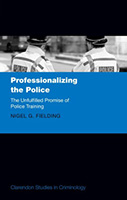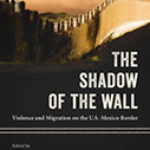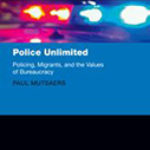Professionalizing The Police: The Unfulfilled Promise Of Police Training

Author: Nigel G. Fielding
Publisher: Oxford; New York, NY: Oxford University Press, 2018. 288p.
Reviewer: Thomas Feltes | September 2019
Nigel Fielding´s book intends to evaluate police training, “grounded in analysis of the nature of the contemporary police mission”. The author deals with police training in the UK. Other countries are not covered, although in some parts of the book research from other countries and their situations are mentioned in a very short and rudimentary fashion. Second, the term “evaluation” must not be understood in a scientific way, e.g. an evaluation by scientific methods. There is no study quoted in this book dealing with evaluation of the results of police training, even though worldwide some such studies do exist.
The book contains two main parts. The first part (chapters 2 and 3, p. 21 – 99) deals with the results of police research over the last 50 years; the second part (chapters 4, 5 and 6, p. 100 – 200) with police training itself. The final chapter 7, titled “The New Policing Landscape” (p. 201 – 227) summarizes what has been said before and tries to answer the question, which is indirectly asked in the title of the book: Is the promise of professionalization fulfilled by police training? Unfortunately, the author does not really answer this question. The two main parts of the book are neither combined nor linked to each other. Instead, the author describes (as opposed to analyses) the results of much (although not all) police research over the last several decades.
The general editors of the series claim in their introduction that “(o)ne of the real strengths of this book is its in-depth discussion of the function of policing, how this has evolved, and the implications for the role of the police and their interactions and relationships with the public”. In fact, the book is more a description than a discussion, although it does give a good overview of what aspects have been dealt with in police research.
To mention some of these topics:
- How officers´ time is used: police officers are less often busy with crime-related activities than is usually assumed (and as the term “crime fighters” implies) (p. 17).
- Police presence as a chimera: research estimates that “to get one more officer permanently out on patrol five further officers would be needed” (p. 16). This figure might be true for the UK, but the necessary positions in most forces are higher (up to ten for one available officer), when taking into account vacation, illness, training, posts for detectives (which have to be increased, if you increase patrol) and so on.
- The police are an agency of first resort: over a third of calls are social work-type issues (p. 21).
- Public beliefs about crime are inaccurate (p. 31): consequently, the fear of crime is not related to the amount of crime, but rather to other societal factors.
- Police and disabled people (p. 43): in 2010, 19% of disabled adults were victims of crime in England and Wales.
- The police and mental illness: police spend 15-25% of their time dealing with people with mental health problems (p. 86), with an average of 2.5 hours spent dealing with each call. Police often request the assistance of other agencies with respect to mental health issues, but seldom receive it (p. 87).
- “Only” 9% of recorded crime results in a criminal conviction (p. 63): the author makes no comment about why this is the case, nor what it means for individual police officers, and what might be the consequences for the criminal justice system as a whole.
- Body cameras have different impacts (p. 78).
- Women in policing might have an impact, but why this is or might be the case is not discussed (p. 177).
- The discussion of defining and measuring police work (p. 24 – 32) comes with many figures (e.g. on costs of the police force), but lacks comparative data and any kind of assessment of these figures.
All these “results” of police research are taken from UK studies. There is no comparative assessment, no taking into account what researchers in other countries have found (with, e.g., some examples from research in the United States). Notwithstanding these deficiencies, the book claims to focus on contemporary police research, on the theory of police legitimacy, and on community policing, and to draw on conceptualisations developed from socio-legal studies and from ethnographic studies of occupational culture. Police professionalism has claimed to come increasingly to the fore in recent years following a succession of policing scandals – but the author here does not provide us with any clear answers as to whether this professionalism has really happened, and if so (or not), what the consequences are.
Evidence-based policing, hot spots policing and many other “modern” techniques of policing (like community policing) are mentioned in the book (e.g. on p. 33 – 35). The author gives an account that presents both the pros and cons of these various policies and practices, but very often one misses a clear statement or “evaluation” by the author himself, any definitions, whether these are techniques or philosophies, or what the consequences of the policies and practices might be.
Fielding puts an emphasis on the importance and limitations of police training. This is good. He calls for new curricula – but for what kind of curricula? Police training should “take into account both policing needs as well as the wealth of knowledge from educational fields and sciences like criminology”. He mentions the different approaches both in duration and intensity of training (p. 220), and he highlights the importance of both classroom and experiential learning, the balance of academic and vocational training – but he does not let the reader know why this can have an impact on policing and how training can be improved.
At the end of his book, Fielding points out that policing´s contemporary rhetoric of managerialism, consumer focus, and technological fixes is “an expression of unreconstructed modernism” (p. 226). He says its vision of professionalism is “as mechanical as laying down `international occupational standards´ and providing checklists to show they have been met”. Unfortunately, he does not deal with the main consequence of police reforms in different countries, e.g. Scotland, where the police made a shift towards a fundamentally different kind of organisation. The increasingly abstract character of the police resulted in changes in their internal and external relations. They became more formalised and dependent on rigid systems and system information. Citizens and communities became more distant from the police. This in fact already has and will have an impact on police work, on police-citizen relations, and on police training and education.
Fielding summarizes his book as follows: “Late modernity is a time of uncertainty and scepticism. In `post-truth´ times, professionalism must accommodate ambiguities of class, faith, ethnicity, and sexuality. Rather than `community policing´ there is `policing communities of risk´, in which a shared fear of crime does not imply shared community spirit. We now understand that the public assess risk not by the reality of crime but by imagined realities. Even sustained and substantial impact on crime rates does not improve public confidence. The police languish as last believers in a monochrome vision of society while the norms making for contemporary sociality have moved on to a multiplex of diversities that harbour new extremes both to tolerance and hate” (p. 226).
What we are left with is the unfortunately unanswered question of what the police can do or should do to cope with these developments. If as many believe, liberal democracy is in crisis in many places in the world, then more democratic and liberal police and policing are necessary than has ever been the case before. Scholars should be studying and talking about these developments, intensively and loudly.
Professor Dr. Thomas Feltes, Chair of Criminology and Police Science, Ruhr-University Bochum, Germany.


